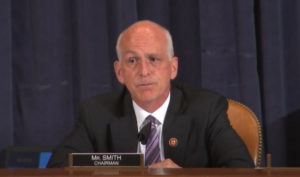The House Armed Services Committee on Wednesday evening unanimously passed its $740 billion fiscal year 2021 defense authorization, while approving new amendments to block the removal of troops from Germany and renaming bases named for Confederate leaders within a year.
The mark-up hearing wrapped up just before midnight following a series of debates that included voting down proposals to reduce funding for the Ground-Based Strategic Deterrent program by $1 billion and expand lobbying restrictions for military officials entering the private sector.

Lawmakers also approved a series of amendment packages late in the hearing that included provisions for establishing an alternative space acquisition system for U.S. Space Force, improving oversight of the Next-Generation Interceptor program and prioritizing the hypersonic and ballistic missile tracking space sensor within the new spaced-sensor architecture.
The final vote on Rep. Ruben Gallego’s (D-Ariz.) amendment to restrict the potential movement of 9,500 troops out of Germany was approved by a 49 to seven vote, with Rep. Ro Khanna (D-Calif.) joining six Republicans in voting against the measure.
“I was very concerned by the proposals that were floated by a couple people in the White House that not only would we bring a lot of troops out of Germany but we would put troop caps on how many Americans could ever be in the country at any one particular time. The effect of that would mean we couldn’t do exercises and we also couldn’t use Germany as a transit point for going to other theaters,” Rep. Mac Thornberry (R-Texas), the HASC ranking member, said earlier on Wednesday.
A vote to approve Rep. Anthony Brown’s (D-Md.) amendment on renaming bases named after Confederate leaders was split largely among party lines, with Reps. Don Bacon (R-Neb.) and Paul Mitchell (R-Mich.) as the only Republicans voting in favor.
“I learned to fly at Ft. Rucker. I deployed to Iraq from Ft. Bragg. I learned how to jump out of airplanes at Ft. Benning. These bases honor traitors who fought to uphold slavery. It’s time to rename them. My [NDAA] amendment will finally make this long overdue change,” Brown said in a social media message on Wednesday.
The president on Tuesday evening threatened to veto the NDAA if the final bill includes a provision to rename bases.
An amendment from Khanna, voted down 12 to 44, had called for reducing the Northrop Grumman [NOC] Ground Based Strategic Deterrent program to build a new intercontinental ballistic missile (ICBM) by $1 billion and moving the funds toward pandemic preparedness efforts.
“The United States does not need to be modernizing the ICBM’s,” Khanna said. “The reality is we have a complete strategic deterrent capability within our submarines and with our aerial strategic bombers. We have every capacity to have complete deterrence. With the ICBMs, you have the risk of accidental nuclear war.”
Rep. Mike Turner (R-Ohio) called the proposal a “unilateral disarmament” and joined Republicans and most of the committee’s Democrats in voting against the measure, while HASC Chairman Adam Smith (D-Wash.) did vote in favor.
A proposal from Rep. Jackie Speier (D-Calif.) to extend the period restricting former high-ranking military officials from taking on lobbying positions was also voted down during the hearing.
Speier’s amendment would have extended the “cooling off period” for three- and four-star generals from two to four years.
“Rather than weakening ethics standards, I believe we should strengthen them,” Speier said.
Earlier on Wednesday, HASC approved a series of amendment packages that included provisions to repeal the Pentagon’s Chief Management Officer position, calls for the Army to assess its tactical wheeled vehicle and Shadow drone replacement strategies and directing a report on naval subsystem technology development.
Rep. Mac Thornberry (R-Texas), the HASC ranking member, also previewed an amendment he plans to bring to the House floor addressing the Pentagon’s ‘use or it lose it’ spending, which would allow the department to hold over 50 percent of unspent funds for the following fiscal year (Defense Daily, July 1).